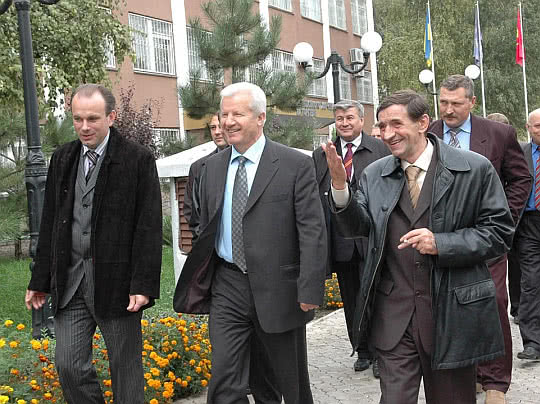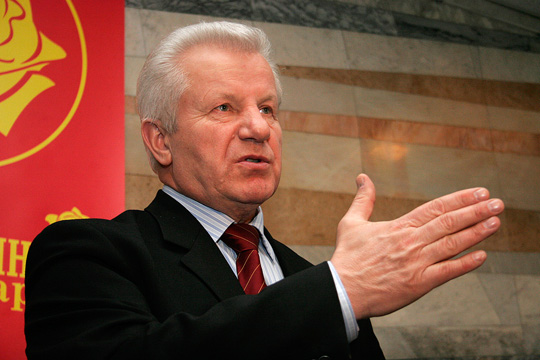Moroz, Oleksandr
Moroz, Oleksandr [Мороз, Олександр], b 29 February 1944 in Buda, Tarashcha raion, Kyiv oblast. Politician and leader (1991–2012) of the Socialist Party of Ukraine (SPU); formerly (1994–8 and 2006–7) speaker (chairman) of the Supreme Council of Ukraine. He graduated as a mechanical engineer from the Ukrainian Agricultural Academy in Kyiv, and also studied at the Higher Party School of the Central Committee of the Communist Party of Ukraine (CPU). After graduation, he served in the army, then worked as an engineer and teacher in the agricultural sector. He began Party work in 1976 in the apparatus of the Kyiv oblast CPU oblast committee, eventually becoming head (1989) of the organizational department. In 1990 he won election to the Supreme Soviet of the Ukrainian SSR from a Kyiv provincial constituency and served as secretary of the parliamentary commission on problems of the agro-industrial complex. Until August 1991, he was leader of the Communist majority in the Supreme Soviet. Following the coup in Moscow and the banning of the Communist Party, not all Communists were prepared to acquiesce to the predominance of the alliance of nationalists and national communists led by Leonid Kravchuk. Under the leadership of Moroz, a successor to the CPU, the Socialist Party of Ukraine (SPU) was founded in October of that year. Thereafter, Moroz and his SPU would champion the economy and the economic well-being of the people, harking back to the security of Soviet times, as against the uncertain state-building policies of Kravchuk.
In 1994 Moroz was re-elected to the Supreme Council of Ukraine and won the post of speaker (chairman) which he held until 1998. This position was one of considerable influence and brought him into conflict with the new president, Leonid Kuchma. Nevertheless, he did co-operate with Kuchma, as when he co-chaired the Constitutional Commission with the president, and compromised in 1995 over the Power Bill which gave the president predominant power over parliament and the government in the interim pending agreement on the Constitution. He insisted that parliament should be the sole law-making body and opposed referendums. Consistent with that view, he steered parliament towards approval of the Constitution on 28 June 1996 rather than accept Kuchma’s threat of a referendum in September. The position of speaker made him the second-most powerful politician in Ukraine, but his reputation for honesty was sullied when he fought to uphold the parliamentary immunity of deputy speaker Oleksandr Tkachenko (who had embezzled millions from the state treasury) as well as of Pavlo Lazarenko.
In the 1994 presidential election, as one of seven candidates Moroz campaigned in favor of a parliamentary republic, opposed the sale of land, advocated a slow and fair process of economic reform, and took a position on foreign and defense policy which he himself summed up as: ‘Anyone who does not miss the days of the Soviet Union does not have a heart; and anyone who thinks it can be brought back does not have a head.’ He obtained 13.3 per cent of the vote in the first round.
The Socialist Party of Ukraine and the Peasant Party of Ukraine contested the 1998 elections in an alliance; Moroz was at the head of the bloc’s list for the proportional representation ballot. The bloc obtained 8.6 per cent of the vote, but Moroz instead took the seat he won in a single-member district in Kyiv oblast. He assumed the leadership of the 25-member ‘Left Center’ caucus of Socialist and Peasant deputies, and became head of the parliamentary committee on agricultural policy.
In 1999 Moroz again contested the Presidency, running third as before with 11.3 per cent of the votes. He was re-elected leader of his party in May 2001. It was Moroz who revealed the incriminating tapes related to the Heorhii Gongadze case in November 2000, thereby unleashing a prolonged crisis which severely impaired the reputation of President Leonid Kuchma and his closest associates, broke up the pro-presidential majority in parliament, and resulted in the dismissal of Prime Minister Viktor Yushchenko and several other senior cabinet members. On the basis of the tapes, Moroz called unsuccessfully for Kuchma’s resignation, including holding a referendum on the question. In addition to leading the Ukraine Without Kuchma and Arise, Ukraine! movements, he joined with Yuliia Tymoshenko and other oppositionists including Viktor Yushchenko in the Front for National Salvation. Following the 2002 elections to the Supreme Council of Ukraine, Moroz and his Socialist Party of Ukraine joined Tymoshenko, Yushchenko, and the Communist Party of Ukraine in official opposition to the Kuchma government.
In 2004, Moroz again contested the presidential elections, and came third with 5.8 per cent of the vote; after the first round, as previously agreed between themselves, Moroz supported Viktor Yushchenko for the presidency. As this contributed to the ultimate outcome of the Orange Revolution, a victory for Yushchenko, Moroz’s Socialist Party of Ukraine was rewarded with three ministries in the government of Prime Minister Yuliia Tymoshenko in 2005, along with chairmanship of the State Property Fund and several oblast governorships. Following the 2006 parliamentary elections, in which the Socialists won 5.7 per cent of the vote for 33 seats, negotiations dragged on for months on the assignment of top positions in the Supreme Council of Ukraine. There had previously been drawn up a written agreement among the coalition partners—the Yuliia Tymoshenko Bloc (BYuT), Our Ukraine, and the SPU—that Tymoshenko would be premier and Petro Poroshenko, speaker. Moroz was offered deputy premier, but he wanted to return to the speakership. Unexpectedly, Moroz defected to join the ‘anti-crisis coalition’ together with the Party of Regions (186 seats) and the Communist Party of Ukraine (21 seats), and nominated himself for the speakership. He was successful (BYuT and Our Ukraine abstained from voting), and Viktor Yanukovych returned as prime minister. Moroz’s betrayal provoked a scandal and fierce conflict which resulted in the calling of early elections in 2007. In those elections, the SPU failed to cross the threshold and Moroz and his party were excluded from the Supreme Council of Ukraine. In the presidential elections of 2010, Moroz obtained just 0.37 per cent of the vote, dropping to eleventh place out of 18 candidates. In 2012, after losing a SMD contest in Kyiv oblast to Oleksandr Onyshchneko of the Party of Regions, Moroz acknowledged that his switching sides in 2006 had been a mistake; he resigned as leader of the SPU the same year.
Throughout his career, Moroz advocated for a parliamentary form of government, non-bloc status for Ukraine, a market economy with government regulation, regional autonomy, reprivatization of illegally acquired state assets, election of local governments, and lower taxes. He has always been opposed to private property in land, the directives of the International Monetary Fund (IMF), and imbalance of power. In July 2016, he became leader of the Socialist Party of Oleksandr Moroz, and was registered as such as candidate for the presidency in 2019. His election program promised constitutional revision, a tribunal to try officials implicated since 1991 in genocide, a law on impeachment of the president, parliamentary elections using open lists and reducing the Supreme Council of Ukraine to 385 seats from 450, life imprisonment for corrupt officials, and a Baltic-to-Black Sea waterway. Moroz withdrew his candidacy in March 2019, but it was too late to be deleted from the official ballot paper.
BIBLIOGRAPHY
Moroz, O. Mizh vichnymy poliusamy (Kyiv 1999)
Moroz, O. Interv’iu dlia Vas, 2d edn (Kyiv 2009)
Bohdan Harasymiw
[This article was written in 2020.]


